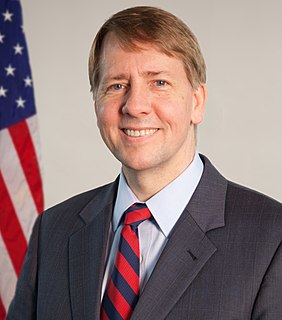A Quote by Marsha Blackburn
I support safeguarding users' personally identifiable information and sensitive data like health or financial records. I also believe the government has a responsibility to punish deceptive and unfair practices that defy reasonable expectations about consumers' privacy.
Related Quotes
On the information technology side, health care is still behind other industries. There needs to be a real push to create better electronic health records, more inter-operability amongst various types of electronic systems and cybersecurity is becoming a huge deal in in health care. Health care records are highly sought after by virtue of the fact that not only do you have somebody's person financial information, you also have their person medical information.
After Jessica Mitford published 'The American Way of Death' in 1963, to expose the abuses in the funeral industry, a groundswell of support for government intervention followed. Under President Ronald Reagan The Funeral Rule was first enacted to protect consumers from deceptive practices, but the rule has yet to put the nail in the coffin.
I don't think he would have had any trouble answering Justice Sonia Sotomayor's excellent challenge in a case involving GPS surveillance. She said we need an alternative to this whole way of thinking about the privacy now which says that when you give data to a third party, you have no expectations of privacy. And [Louis] Brandeis would have said nonsense, of course you have expectations of privacy because it's intellectual privacy that has to be protected. That's my attempt to channel him on some of those privacy questions.
We see it in attempts on Capitol Hill to impose gag rules on rules on doctors on what they can say to their patients about family planning. And we certainly see it now with an effort by the government to tap our phones; invade our medical records, credit information, library records and the most sensitive personal information in the name of national security.
When dealing with data, scientists have often struggled to account for the risks and harms using it might inflict. One primary concern has been privacy - the disclosure of sensitive data about individuals, either directly to the public or indirectly from anonymised data sets through computational processes of re-identification.
The government's collection authority, under the Patriot Act, is basically limitless. They can get the medical records and financial records, gun purchase records. And it also becomes part of another important issue that relates to the FISA court and the rest of the debate. It almost becomes a secret law, like there are two Patriot Acts. The one you read on the laptop essentially leads you to believe that there's some connection to terror .
Consumers will purchase high quality products even if they are expensive, or in other words, even if there are slightly reasonable discount offers, consumers will not purchase products unless they truly understand and are satisfied with the quality. Also, product appeal must be properly communicated to consumers, but advertisements that are pushed on consumers are gradually losing their effect, and we have to take the approach that encourages consumers to retrieve information at their own will.
Whether it's Facebook or Google or the other companies, that basic principle that users should be able to see and control information about them that they themselves have revealed to the companies is not baked into how the companies work. But it's bigger than privacy. Privacy is about what you're willing to reveal about yourself.


































